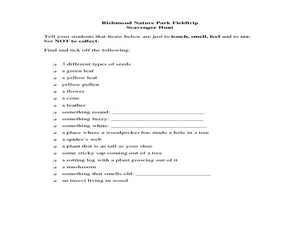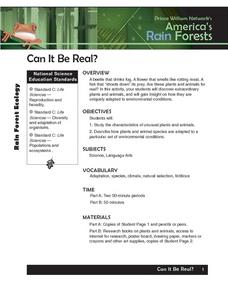Curated OER
Understanding the Roots
Students investigate the parts of a flower. In this earth science lesson, students read the book The Magic School Bus Plants Seeds and identify various plant parts. Students construct a model of a flowering plant from various art supplies.
Curated OER
Altering a Plant Environment
Students investigate what a controlled group is by creating an experiment. In this plant growth lesson, students identify the different parts of a plant and discuss what is needed for a plant to be successfully grown. Students grow a...
Curated OER
Life cycles
Students identify and explain the parts of a flower and their role in the life cycle of flowering plants, including pollination, seed dispersal and germination using the Internet. Students will also study and discuss the key points and...
Curated OER
Examining Seeds
Learners explore botany by conducting an investigation in class. In this seeds instructional activity, students utilize lima bean seeds and magnifying glasses to examine the different parts of a seed after it has been dissected. Learners...
Curated OER
What We Need
First graders identify basic needs of plants. In this plant growth lesson, 1st graders observe types of plants and review the parts of a plant as well as the development of a seed. Students review related vocabulary and read The Carrot...
Curated OER
Richmond Nature Park Field Trip
Students identify different plants and their uses by attending a field trip. In this Canadian plant lesson, students explore the great outdoors of Vancouver, B.C. and discuss the uses of plants by the Native Americans that once resided...
Curated OER
Whose Parts Do I Have? (Wings and Things)
Pupils identify an animal and a body part and then matches a body part to a specific animal. This will assess their ability to sort organisms and objects into groups according to their parts and describe how the groups are formed and...
Curated OER
Logs of Straw: Dendocronology
Students investigate the age of trees by analyzing tree rings. In this dendocronology lesson, students examine sample images of tree rings and identify their age by the amount of rings. Students complete a chart identifying the age,...
Curated OER
Leaf Straw
Students investigate plant structure and the process of photosynthesis. Using everyday items, they demonstrate that the leaves and stems of plants can act like a straw. In addition, they identify plant structure.
Curated OER
Plants -- What Are Their Parts and Functions?
Students identify the parts of a flowering plant and their functions. They describe its life cycle as well. They compare the parts of the plant to the roles that are needed in a democracy.
Curated OER
Plants
First graders learn the basic needs of plants, label the major parts of a plant and name their uses. They also use a KWL chart.
Curated OER
Life Cycles of Plants
Students discover the general life cycle of a plant, the parts of a plant, and what it needs to grow. They plant bean seeds and discuss the parts of a plant and what it needs to grow.
Curated OER
Traveling Through the Digestive System
Second graders learn about how the food is broken down in our bodies and the job of each body part involved in our digestive system. The utilize the CD ROM game, "Body Works." This wonderful game takes pupils through the human body's...
Curated OER
Vegetation Scavenger Hunt
Students use picture cards to familiarize themselves with plant structures and characteristics. They collect plant specimens without destroying the plant and mount them creating a class herbarium.
Curated OER
Tree Cookies!
"Tree Cookies!" is a delicious little presentation designed to introduce upper elementary or middle school botanists to the anatomy of a tree trunk. The cambium, phloem, xylem, and other vital structures are identified and defined. Two...
Curated OER
Sun Seeking Plants
Pupils investigate the story "The Tiny Seed" by Eric Carle. This story is used to introduce the children to the concept that seeds change and grow into plants when conditions in the environment including temperature, light, water and...
Curated OER
PLANT PARTS WE EAT
Students identify an assortment of vegetables and learn how to locate the parts humans use for food. Students identify the plant parts we eat. Students color the pictures on their worksheets as provided. Students match the plants to the...
Curated OER
COMPARE SOILS BY GROWING PLANTS
The student will identify the difference in the rate of plant growth in three soils that vary in organic matter.1. Obtain three to four flowerpots, different types of soil, a record chart, three to five beans for each pot, and water....
Curated OER
Biomes -- Part II
Learners use the internet to gather information on the biomes of the world. They identify the climate and unique characteristics of each biome along with any threat to them. They create their own campaign to preserve wildlife.
Curated OER
What Do Plants Need to Grow?
Students in an ESL classroom identify the necessary requirements plants need to grow. Using Spanish worksheets, they label each part of a plant and state their function. They are given cutouts of a picture and the Spanish word in which...
Curated OER
Wacky Weed Parts
Students view picture of weed and identify roots, stems, flowers, leaves, and seeds, describe function of each different weed part, and discuss how different parts of weed work together to benefit plant in its new environment.
Curated OER
Gifts from the Sea
Students investigate parts of the ocean. In this seaweed lesson, students identify foods that contain seaweed, parts of seaweed, and how the ocean affects our lives. As a class students brainstorm ways we rely on the ocean and compare...
Curated OER
America's Rain Forests Can It Be Real?
Students examine the attributes of unusual plants and animals before determining how they are adapted to specific habitat. They complete an associated worksheet. They make posters with information that they find during research sessions.
Curated OER
Wetland Plant Detectives
Sixth graders identify plants in the wetlands. In this plant detectives lesson, 6th graders complete a scavenger hunt on a local reserve, record observations, and respond in their journals.

























